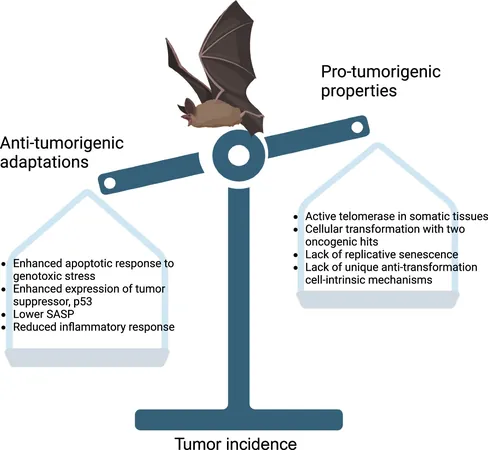
Unveiling the Secrets of Immortal Bats: Why These Creatures Defy Cancer!
2025-06-09
Author: Arjun
Bats' Incredible Cancer Resistance Revealed!
A groundbreaking study from the University of Rochester is shedding light on why certain species of bats can live for decades without succumbing to cancer. Published in the prestigious journal Nature Communications, this research highlights the biological marvels that grant these creatures their extraordinary health.
Bats: Nature's Superheroes Against Cancer!
Imagine living for 35 years, equivalent to roughly 180 human years, without ever facing cancer! Research led by Dr. Vera Gorbunova and Dr. Andrei Seluanov has uncovered the secrets behind the cancer-free lives of four bat species. Central to their findings is a powerful gene known as p53, a natural tumor suppressor.
In humans, mutations in the p53 gene are linked to half of all cancer cases. However, bats have evolved to possess two copies of this gene, along with enhanced p53 activity. This allows their bodies to effectively trigger apoptosis—eliminating cancer cells before they can cause harm. Remarkably, bats maintain a delicate balance, ensuring that their cells survive while still defending against potential malignancies.
Telomerase: The Key to Endless Cell Division!
Bats also benefit from a uniquely active enzyme called telomerase, which enables their cells to divide endlessly, supporting tissue regeneration even as they age. While excessive cell division can lead to cancer, bats’ elevated p53 activity skillfully manages this risk.
An Immune System Like No Other!
Moreover, bats boast an exceptionally efficient immune system, adept at combatting various pathogens. This immune prowess plays a crucial role in their cancer defense, as it helps identify and eliminate developing cancer cells. Unlike aging humans, whose immune defenses wane, bats regulate inflammation effectively, staving off both viruses and age-related diseases.
What We Can Learn from Bats!
So, how do these bat findings relate to humans? The study highlights that while bats can develop cancer with just two cell mutations—far fewer than typically required for humans—their robust biological mechanisms prevent cancerous growth.
The researchers emphasize that boosting p53 activity is a promising approach in cancer treatment, with several existing therapies already targeting this gene. Additionally, safely enhancing telomerase activity could open new pathways in cancer therapy, though this aspect wasn’t examined in the current research.
Pioneering Research on Longevity!
Dr. Gorbunova and Dr. Seluanov have spent years studying long-lived animals, including naked mole rats and bowhead whales, and are now delving into the genetics of exceptionally long-lived humans. Their insights could unveil new methods to combat aging and disease.
With bats leading the way, the fight against cancer may have just found its unexpected allies!



 Brasil (PT)
Brasil (PT)
 Canada (EN)
Canada (EN)
 Chile (ES)
Chile (ES)
 Česko (CS)
Česko (CS)
 대한민국 (KO)
대한민국 (KO)
 España (ES)
España (ES)
 France (FR)
France (FR)
 Hong Kong (EN)
Hong Kong (EN)
 Italia (IT)
Italia (IT)
 日本 (JA)
日本 (JA)
 Magyarország (HU)
Magyarország (HU)
 Norge (NO)
Norge (NO)
 Polska (PL)
Polska (PL)
 Schweiz (DE)
Schweiz (DE)
 Singapore (EN)
Singapore (EN)
 Sverige (SV)
Sverige (SV)
 Suomi (FI)
Suomi (FI)
 Türkiye (TR)
Türkiye (TR)
 الإمارات العربية المتحدة (AR)
الإمارات العربية المتحدة (AR)